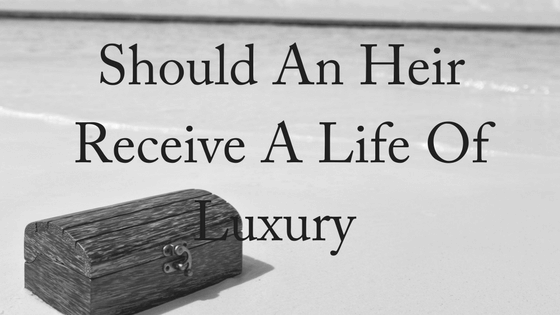A recent case heard in the United Kingdom has those watching wondering whether a marital life of luxury ought to be continued once one of the spouses dies. Should an heir have the right to a life of luxury?
Construction tycoon Ian Wooldridge died in a helicopter crash in 2010 in Northern Ireland. He was worth around £10 million when he died, with assets including the family home in Surrey, worth £4.25 million. His widow, Thandi Wooldridge, received only a £1.6 million inheritance from her late husband’s will and contested it, asking for a further £3.75 million from the estate. At 2016’s hearing before Judge Karen Walden-Smith, she sought the additional sum on the basis that she could not otherwise maintain her life of luxury. But is an heir entitled to make this claim?
 Mrs Wooldridge, who is worth an estimated £10m in her own right, is claiming around £178,000 for her personal expenditure, including social events, clothes and jewellery, £79,000 to maintain her home and garden, £65,000 on family holidays, and £58,000 on transport costs. She explained that she and her son Rhett take holidays in Barbados and she needs funds to keep a Bentley and a Range Rover on the road and said that her husband would have approved of such costs, adding: “He never wanted the house to be a burden to me.”
Mrs Wooldridge, who is worth an estimated £10m in her own right, is claiming around £178,000 for her personal expenditure, including social events, clothes and jewellery, £79,000 to maintain her home and garden, £65,000 on family holidays, and £58,000 on transport costs. She explained that she and her son Rhett take holidays in Barbados and she needs funds to keep a Bentley and a Range Rover on the road and said that her husband would have approved of such costs, adding: “He never wanted the house to be a burden to me.”
Mrs Wooldridge told the judge her husband had discussed his will with her before drafting it and had assured her that she would be well provided for. Her stepson, Charlie Wooldridge, the deceased’s son from a previous marriage, claims that paying out Mrs Wooldridge any further money would seriously jeopardise the business that his father left behind. Should the wife as heir be entitled to enjoy a continuing life of luxury even though she hasn’t contributed to the business or the accumulation of wealth?
What is an Heir Entitled To?
Yet the relevant legal tests the court will apply are no different for wealthy applicants than any other. One commentator says: “The relevant legal principles applying to bereaved spouses state that the court, when considering whether to make an order, should not look at what is strictly required for the widow or widower’s maintenance, but rather at what it would have been reasonable for the claimant to receive in all the circumstances of the case. This is a more generous standard than that applied to any other category of applicant who would, contrastingly, be restricted to reasonable provision for their maintenance.”
The court will look at factors such as the financial resources and needs of the applicant, the financial resources and needs of any other heir of the estate, the size and nature of the estate, the duration of the marriage or civil partnership, and significantly, what provision the spouse would have received if the marriage had terminated in divorce instead of death. The commentator adds: “Helpfully for Mrs Wooldridge, when the court comes to assess the spouse’s financial needs it has been established that what is reasonable will be judged by reference to the life which the spouse lived with the deceased, not an objective standard. Therefore, there is no reason why the court should not take a luxurious lifestyle into account, if the estate can sustain it.”
However the competing interests of her stepson and her own son (who was independently represented) may impact on her own claim on the estate. Penelope Reed QC, representing Mr Wooldridge, told Central London County Court that such a huge payout to his stepmother might have been on the cards if his father had been worth £100 million. “But we’re dealing with a finite pot here,” she told Judge Walden-Smith.
Richard Wilson QC, for Mrs Wooldridge, accepted that she and her husband had lived “an extraordinarily luxurious lifestyle, vastly in excess of what most people could ever aspire to. “That lifestyle included numerous long-haul holidays, accompanied by the most luxurious travel and accommodation on offer.
“It included luxury cars, dinners and social and sporting events and the purchase by Ian of numerous luxury gifts”, he added. He said Mrs Wooldridge’s current resources did not allow her to lead a “comparable lifestyle to that to which she became accustomed during the course of their relationship”.
Denying that Mrs Wooldridge’s demands are excessive, the barrister said she had been instrumental in her husband’s business success. She had “sacrificed” her own high-flying career in the outdoor advertising business so she could give her family her full support, he added.
 It is clear that a spouse bringing a claim for what seems to be an extravagant sum is not automatically preposterous when it genuinely reflects the couple’s lifestyle, and the estate is large enough to cope. However, in the Wooldridges’ dispute this is not necessarily the case, and it will be interesting to see who the Judge favours when she hands down her judgment.
It is clear that a spouse bringing a claim for what seems to be an extravagant sum is not automatically preposterous when it genuinely reflects the couple’s lifestyle, and the estate is large enough to cope. However, in the Wooldridges’ dispute this is not necessarily the case, and it will be interesting to see who the Judge favours when she hands down her judgment.
In each of the states of Australia the law casts an obligation upon a willmaker to make adequate provision for a certain class of heir. In Queensland, a willmaker ought to make adequate provision for the following persons:
· Spouse;
· Former spouse (in limited circumstances);
· Child;
· Step-child;
· A dependent (in limited circumstances).
What is considered ‘adequate’ is at the court’s discretion and depends up many of the factors listed above, such as the size of the estate, any competing claims on the estate and the financial situation of the deceased’s family members.
In these situations, it is imperative that expert advice is sought because it is a complex area of the law. Bryan Mitchell is an Accredited Specialist in Succession Law and offers a free, 10-minute phone consultation. Contact us today.

